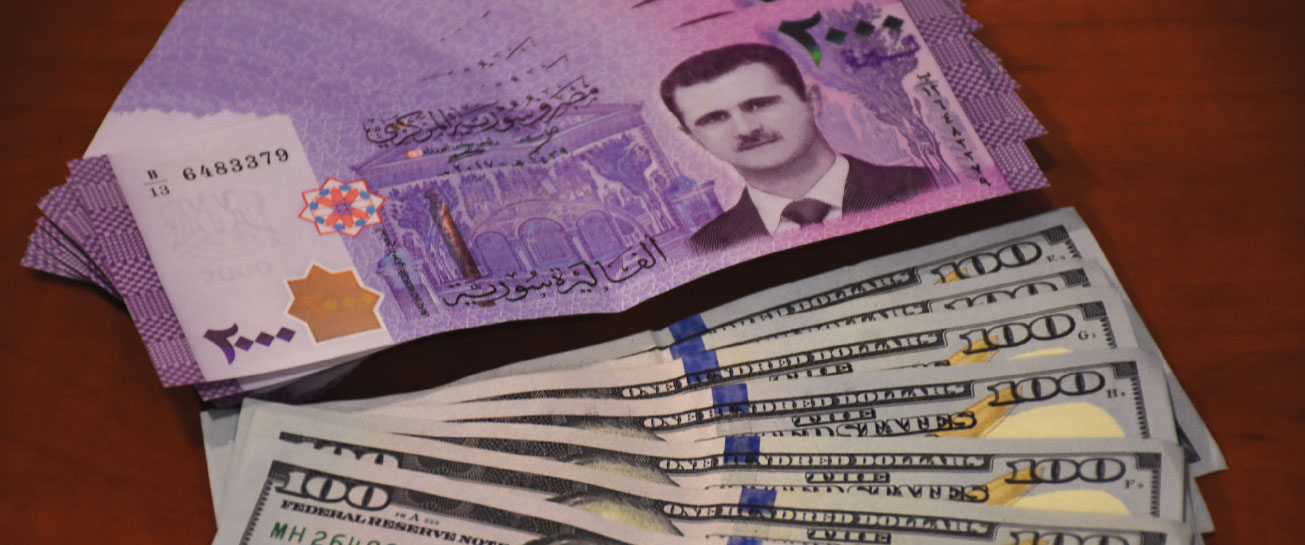The Syrian pound improved notably against the dollar at a rate of more than 15 percent as the price of the dollar fell against the Syrian pound below the 850-pound level in parallel, or “black,” market, amid a major supply, which indicates a continuing improvement of the pound.
Markets had seen a sharp state of stagnation, with a large number of economic and commercial activities and shops closing until the exchange rate became clear.
Regarding the situation and recent developments with regards to the exchange rate, a member of the Damascus Chamber of Commerce, Mohamed al-Halaq, said that the instability of legislation had impacted the instability of the exchange rate. He told Al-Watan that stability was what keeps the production process as it is, adding that what is needed today is real cooperation between the business sector and the government and raising the level of trust.
He added: “We need to be objective—any trader or manufacturer is a consumer of goods in his home, which confirms that the decrease of the exchange rate has a negative impact by all measures, because any trader or manufacturer has workers and employers who are taking part in the production process, and their wages need to be enough to do this. The increase in the prices puts an extra burden on the trader and manufacturer.”
He continued, saying: “We are unable to offer anything except continuing to produce, trade, market and sell. This is what we can do. We are not able to offer consumers prices at the same rate as before, and therefore we are forced to move with the exchange rate, so that we can offer the product.” He said that industry, the economy and commerce needed resilience and continuity, noting that rebooting the production and agricultural process was not easy.
A member of the board of directors in the Damascus Chamber of Commerce, Manar al-Jallad, said: “The talk today doesn’t taste bread. There needs to be real government action, and the Central Bank must move to control the exchange rate, because it is the strongest entity. Otherwise we will remain in a vicious cycle, which will negatively impact the national economy in general and the consumer in particular.”
Jallad told Al-Watan that the rise in prices had led to chaos in the economy, and that no economic plan could be achieved if there was not stability in the exchange rate, which the relevant entities have not yet been able to control.
Businessman Amr Deeb said that, “The newly-blessed traders and property owners are behind the high exchange rate, and they are part of the economic war.” He told Al-Watan that the problem was not the Central Bank or government decisions, but the problem of collective responsibility. “Therefore we traders, manufacturers, and businessmen and the government must be one hand, because the protection of the pound is not just the government’s responsibility.”
One trader preferred to offer some proposals to the government about the exchange rate, saying that the main problem was the transformation of the dollar from a currency for imports to a commodity for the purpose of financial hedging, meaning that the dollar was considered a basis to ensuring the value of monetary liquidity. The previous banking administrative policies confirmed this, and therefore what’s most important now was to set up projects and private-public companies that attract citizens and put them in a framework of investment projects, and keep them away from speculation and negative intervention in the pound’s price, reflected through real estate or investment projects put forward by the government.
This article was translated and edited by The Syrian Observer. The Syrian Observer has not verified the content of this story. Responsibility for the information and views set out in this article lies entirely with the author.


